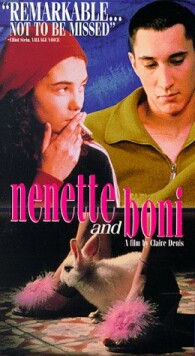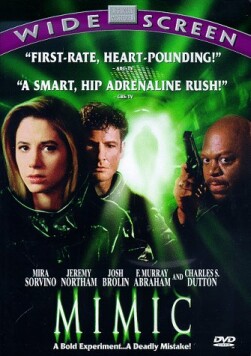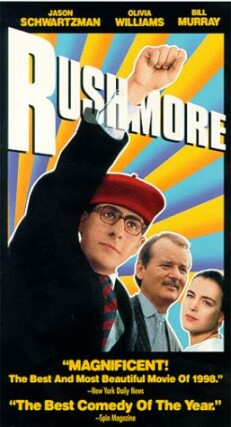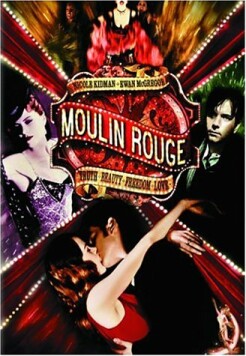Princesas
Though it is too heavily freighted with pathos and sentimentality and a clunky and unnecessary political subtext, Princesas, by Fernando León de Aranoa (Mondays in the Sun), is a frequently interesting portrait of the friendship between two prostitutes in Madrid. Caye (Candela Peña) is one of several working girls who hang out at the beauty parlor run by Gloria (Llum Barrera) and grumble as they look out on the adjacent square where immigrant women are, as they see it, taking work away from them by undercutting their prices. One of the women at Gloria’s notices one of the immigrant women swaying seductively across the square and comments: “They learn to walk that way as kids. They put something in their shoes.”
Caye arrives ten minutes late for an appointment with a john only to discover that one of the immigrants, a beautiful Dominican named Zulema (Micaela Nevárez), has beaten her to him. She tells off the interloper, but later realizes that she is her neighbor in a nearby “warm bed” apartment — that is, one that she rents only during the day, sharing it with the night tenants, another immigrant and his family. One day, when Caye hears the television turned up too loud in Zulema’s flat and finds the door ajar, she goes in to find her beaten up by a man who has been sleeping with her in return for promises of legalizing her status. Caye takes her to the hospital, and the two become close friends.
The political lesson in having a would-be Spanish nativist like Caye pal up with an immigrant is mostly understated and unobtrusive. The only breach in their relationship comes when Caye sends the spaced-out Blanca (María Ballesteros), also known as “Miss Methadone,” to warn Zulema of an impending bust because she’s afraid of revealing their friendship to the other girls at Gloria’s. But even this is soon overcome. Of much more interest to Mr Aranoa is getting the most he can out of the well-worn theme of the pathos in the life of a prostitute. The pun on Caye’s name — a homophone of the Spanish word for “street” — is made much of in order to remind us of her emblematic status as poster girl for the heartbreak of whoredom.
Zulema has left her small son with her mother back in the Dominican Republic and sends home all she can from her earnings in Spain. At least, says Caye, she has something happy to look back on with nostalgia. “I don’t feel nostalgic,” she says, since “nothing worth missing has ever happened to me. How can you be nostalgic for something that hasn’t happened yet?” She hangs on to that “yet” through most of the picture as a fragile life-line of hope. She dreams of one day being picked up from work — “That’s what love is,” she imagines, never having experienced it before — and for a time she thinks her dream has come true with a shy computer engineer called Manuel (Luis Callejo).
In fact, the dream does come true, but only because she dares not hope for too much. “He could be the man of my life,” she confides in Zulema. “I would like to be the woman of his life, even if just for one day.” Their courtship consists of little more than a single scene in which, wearing Zulema’s “Sexy Girl 69” shirt, Caye goes out to dinner with Manuel and tries to tell him how she feels, which she only knows how to do in sexual terms. In the middle of the meal, she has to leave the table to perform a sex act on a former client who might otherwise reveal who she is. To Manuel she has half-jokingly suggested that she has another, a secret identity, like a superhero. When she comes back to the table, he says to her: “I know everything. You didn’t go to the bathroom” — and a panicked look comes into her eyes. “You went to save the world. You stopped a train from derailing. You saved everyone and came back. Am I right?”
The idea of the superhero (or superheroine, as Caya insists) is meant to be cognate with that of the “princesses” from which the film takes its title and which she and Zulema like to imagine they are. And in a way they are saving people too, Mr Aranoa almost wants to say, though they are hated and reviled for it instead of being loved. It’s one of several points at which he pushes the pathos just too far and the film teeters on the brink of emotional excess. Another is when Caye tells Zulema that “the worst thing isn’t if there’s nothing after death; the worst would be if there was another life like this one.”
A more astringent touch is added by Caye’s middle-class family dinners with her mother, brother and sister-in-law, a school principal, that punctuate the film and at which she looks much more miserable than at anything that happens to her in her life as a prostitute — about which the family naturally knows nothing. Her mother (Mariana Cordero) is a dour woman who, Caye believes, sends flowers to herself in order to make people think she has an admirer — or else that her husband, who has long-since abandoned her, is trying to apologize and make up. Caye insists that her father died three years ago, but her mother refuses to believe it. On the one occasion when Zulema joins her at the family table and Caye explains that her mother prints the cards that come with the flowers so no one will know that she has sent them to herself, Zulema asks: “What do the cards say?”
Caye looks blank. No one has ever bothered to read them. The hostility between them runs so deep that she can’t recognize her mother’s loneliness as the mirror image of her own. The leitmotif of the cell-phone ring-tone that Caye can’t answer in her mother’s presence comes to stand for the isolation in which they stand with respect to each other. All this is very persuasively sketched in and helps make Mr Aranoa’s film a mostly enjoyable one that is, like him, just a little too much in love with its own superheroines.
Discover more from James Bowman
Subscribe to get the latest posts to your email.








